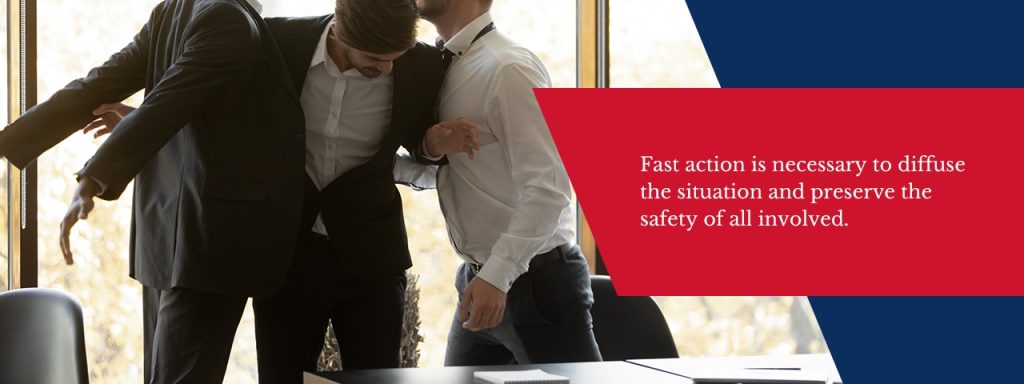Company Preparedness Planning
If you want to protect your company against threats that could hurt people or thwart your success, crisis management plans are essential. Waiting until an emergency occurs and attempting to handle it on the fly will likely result in far more dire consequences. When you prepare for any crisis, you can manage the situation in a way that demonstrates your company’s professionalism and care.
Are You on Guard for Intruder Emergencies?
If an intruder entered your facility and tried to cause harm to customers or employees or attempted to steal or damage assets, do you feel confident someone would quickly and safely stop them? Intruder emergencies are an unfortunate scenario that all companies should prepare for. Without a plan in place, you could leave your tangible and intangible assets vulnerable.
Too many companies learn the hard way that their security is inadequate. Bolster your corporate security measures to prepare before an incident ever occurs. Some examples of security measures that can help you prevent and respond to intruder emergencies include:
- Trained security officers on-site
- A video surveillance system to detect and record criminal actions
- Key cards or other security measures for facilities that are not open to the public
- Emergency drills to help employees rehearse for various events
- A panic button to discreetly alert law enforcement of an incident
Every company is different, so the optimal security measures for your business may vary from those of another company, even one in your industry. Consult with a security expert to see where you can mitigate risks and prepare for a potential intruder situation.
Are You Ready to Handle Medical Emergencies?
If a customer fainted or started having cardiac arrest symptoms while at your business, or an employee fell and broke a bone, do you know how you would respond? Medical emergencies occur every day, and companies must be ready to intervene immediately to help their employees or guests.
The Occupational Safety and Health Administration requires businesses to undertake medical and first-aid measures commensurate with their workplace’s potential hazards. Any business should conduct a risk assessment to be aware of any dangers that could lead to medical emergencies. As much as possible, employers should mitigate these risks, but medical emergencies can still take place at even the safest of facilities. For example, an employee’s or client’s existing medical condition could result in a life-threatening situation.
All businesses should have the following measures in place to prepare for medical emergencies. If you lack any of these, you may not respond correctly.
- Training for employees to recognize the warning signs of a medical emergency
- First-aid-trained personnel on-site at all times if the facility isn’t near a medical facility
- Up-to-date, accessible first-aid supplies
- A plan for responding to customer emergencies
- A specific designation for who should contact emergency dispatch
- Posted phone numbers for local emergency services
- Any other medical training or equipment required by OSHA according to your industry or operations
Do You Know How to Respond to Workplace Violence?
Another situation all companies should account for in their crisis management planning is a workplace violence emergency. The Federal Bureau of Investigation defines four types of workplace violence:
- In some instances, criminals inflict violence on employees or customers in your business establishment as part of carrying out another crime, typically a robbery.
- Angry or imbalanced consumers, such as clients, patients, customers, or students, may become violent against employees or other consumers.
- A disgruntled former or current employee may become violent with supervisors, managers, or co-workers.
- In many instances, a personal acquaintance or relative — often a domestic abuser — of an employee shows up at their workplace and becomes violent with them.
If any of these situations occurred, would you know how to respond? Fast action is necessary to diffuse the situation and preserve the safety of all involved. Workplace violence preparedness is especially critical if you work in health care, since workplace violence injuries are five times more common in this industry than in others.
Regardless of your industry, you should prepare for a potential incidence of violence in your workplace by identifying potential risks and developing a crisis management process to follow in the case of a violent occurrence. You should also have a procedure in place that allows employees to report possible threats or incidents.
Do You Have a Plan for Severe Weather Emergencies?
If a severe environmental emergency — such as a hurricane, tornado, earthquake, or wildfire — struck, would you know what to do? Nobody can control the weather, so it is wise to implement an action plan to ensure these events do not turn into corporate crises. All business leaders need to be aware of the severe weather risks in their geographical region and make contingency plans, even for unlikely scenarios.
For any potential natural hazards that could affect your business, make sure you have a comprehensive emergency plan that outlines how your company will:
- Keep employees safe.
- Minimize damage to your property and physical assets.
- Protect and preserve digital records and data.
- Continue business operations, even if your facility closes.
- Keep employees and customers informed.
- Apply for government relief.
You should also conduct drills periodically, so employees know how to respond if an emergency weather event occurs. Consult the Business page on Ready.gov for tools to help you plan for these emergencies. You may want to assemble a crisis response team who will be responsible for coordinating these efforts and for making timely decisions following a severe weather emergency.
How Will You Respond to a Major Power Outage?
Closely related to severe weather events is another emergency businesses should prepare for: a power outage. If your city or facility loses power, would these circumstances be disastrous for your company? What if the disruption lasted for days on end? Would your business have to close its doors, or would you make adjustments and continue serving customers?
Without backup power, an outage can lead to a severe disruption in your operations and other problems like possible data losses. To avoid these scenarios, companies should:
- Calculate their electricity demands.
- Properly install a generator that can handle your essential power demands.
- Invest in safety systems with backup battery power.
- Invest in surge protectors for equipment.
- Develop a plan for how business operations will proceed during an outage.
In 2018, the average American experienced 5.8 hours of power disruptions. Since this is such a frequent issue, all companies should have a business continuity disaster recovery plan, so an outage does not derail their operations.
Partner With Silverseal to Better Prepare Your Company for Potential Threats
Crisis management planning for businesses is a must if you want to meet adversity with confidence and competence. An emergency can either become a major crisis with residual consequences, or a situation you quickly put behind you. If your company needs help formulating plans for any of the scenarios outlined here or other possible threats, contact Silverseal. Our team can help you understand your risks and implement measures to secure your company.



